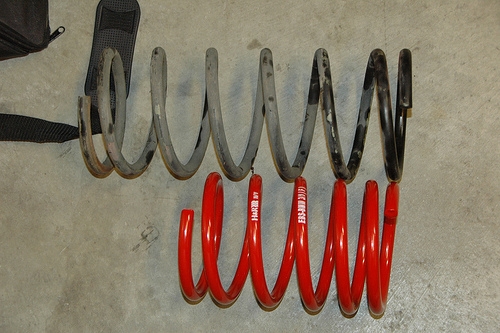
Most modern light vehicles employ coil springs in their suspension systems. A coil spring, known also as a helical spring, is a mechanical device that absorbs shock and maintains a force between contacting surfaces. This device is a special type of torsion spring that compresses or extends as pressure is applied. Vehicle coil springs maximize friction between the vehicle's tires and road surface.
Vehicle coil springs provide steering stability for better handling and ensure comfort to passengers in all road surfaces. These springs are fabricated from large, tensile metal wires specially heated and formed to spiral shape. Coil springs have different load-carrying attributes depending on wire diameter, its shape, the overall spring diameter, and the spacing of the coil springs. These springs look the same but give different load ratings for different vehicles. Small passenger cars have lighter and more flexible coil springs, while a light commercial vehicle employs robust and fairly stiff coil springs.
The helical springs are helix-shaped coiled wire use for tensile or compressive loads. The cross-section of the coil spring wire may be circular, rectangular, or square in shape. There are two forms of helical springs namely compression helical spring and tension helical spring. Major advantages of helical springs are its easy assembly and availability in wide ranges. These springs have constant spring rates and performance that are accurately predictable. The characteristics of these springs vary by changing its dimension and wire diameter.
A progressive spring allows optimum spring rate for different road conditions or application. The coil pitch gets tighter as it gets to the top of the spring. This gives the spring increased resistance as it is compressed. Most manufacture-fitted car springs are normally wound or consistently pitched all the way to the spring. Car owner usually upgrades to progressively wound springs from normally wound springs to address vehicle traction, handling, and control concerns. Under a light load, progressive springs deflect energy but increase resistance as the load increases, giving a softer ride.
The characteristics of the coil springs depend on the material and design from which it is manufactured. These are generally made from various materials like steel alloys, high carbon wire, non-ferrous metals, and stainless steel. Coil spring materials generally have high tensile strength to withstand different load demands. It can look the same but these springs give different load ratings which are normally color coded for identification. The springs may be cylindrical, barrel-shaped or conical in shape. Similarly, different wire diameters are used in manufacturing the coil springs.
Coil springs support a vehicle frame and ensure smooth ride to its passenger in different road surface and conditions. It is important to understand maintenance of these devices for better vehicle handling and control. Bad and worn out coil springs make vehicle tires misaligned and show excessive tire wear. Excessive vehicle bounce, especially in rough or uneven roads, exhibits a bad coil springs in the suspension of the vehicle. Vehicle stabilizing and handling capabilities are compromised with a broken coil springs which will manifest excessive sway and wobble.